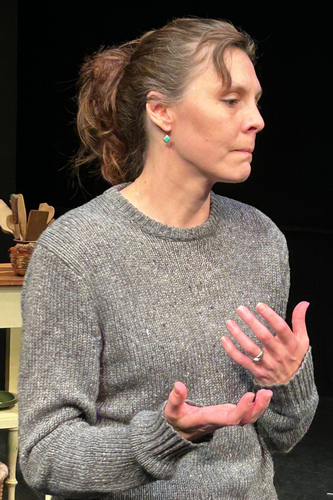WEST CHESTERFIELD, N.H. — The Actors Theatre Playhouse (ATP) presents Nia Vardalos's adaptation of Cheryl Strayed's popular memoir Tiny Beautiful Things on Thursdays, Fridays, and Saturdays, Aug. 17 through Sept. 2, at 7:30 p.m.
Described as "a celebration of the simple beauty of being human," this play is based on Strayed's (Wild) journey as the beloved anonymous advice columnist "Dear Sugar."
Over the years, thousands of people turned to Sugar for words of wisdom, compassion, and hope. At first unsure of herself, Sugar finds a way to weave her own life experiences together with the deep yearning and heartrending questions from her readers.
"Tiny Beautiful Things is rich with humor, insight, compassion and absolute honesty, it is a play about reaching when you're stuck, healing when you're broken, and finding the courage to take on the questions that have no answers," reads a news release.
The cast features Kenzie Yelin, Wendy Almeida, Dakota Benedetto, and James Duffy. It is directed by Burt Tepfer.
In an interview with Nancy A. Olson for ATP, Tepfer said he chose the play after seeing Strayed give a talk before a packed house at the Latchis Theatre in Brattleboro during her 2019 book tour.
"I've been involved in theatre for 40 years. I read a lot of plays," he said. "When I read this script, I thought, 'This is a gripping, powerful piece, the most emotionally impactful play I've ever been involved with.' I was amazed by her. I talked with her after her lecture and invited her to see the version I was directing, but COVID put an end to that. So this current production was four years in the making."
Vardalos, the Academy Award-nominated writer of My Big Fat Greek Wedding, developed the script from Strayed's book, a collection of the letters written to her and the replies she wrote as Sugar. Strayed had to okay everything in the script.
Tepfer said there were some challenges in putting this production together.
"The play can seem static - there's not much action. So I have to bring some motion to it, bring it alive, by making the scenes visually interesting. I have to move people around the space in configurations that catch the audience's attention. That choreography took some doing. When one letter-writer is talking, the other letter-writers pay attention and listen, as if they are readers of Sugar's column, as the audience is."
Given the long gestation for this production, Tepfer was asked about the difference between the before and after times of the pandemic, and how it might have affected his approach.
"There are more difficulties in our emotional lives: more angst, anger, disaffection, and polarization in our society than three years ago. The letter-writers are really hurting. Their circumstances are varied, some serious and traumatic. Sugar responds to them in a caring, loving, compassionate, forthright, empowering way to help people face their challenges.
"This play makes us more human. It broadens and softens our view of humanity - helps us empathize. We're more intolerant than we were. We have less capacity to see others' problems. We need this play.
"It's important to remember: these letters are real. Sugar's answers are real. She divulges her vulnerability. She uses her own tumultuous past to offer others hope and empowerment, to help them think differently about their lives and to feel better about themselves. The message under all the letters is 'I want love, and I'm afraid I'm never going to get it.' The letter writers don't think they're worthy, and Sugar helps them to see that they are."
Tepfer said he took "a no-frills approach to the play. Each individual character has to be fully developed-I want that depth. I focus on the relationships at hand. It's the words in the play that count. What is the moment trying to say? How can I help these thoughts, emotions, and content be received by the audience?
"I haven't directed too many comedies. Plus, this is a no-frills theater space. This play has very little set. I have to be very conscious of how actors move in relation to the audience."
According to Tepfer, you can tell the success of a production "by how quiet the audience is. In live theater, if you've really captured their attention, during the show there is no shuffling of feet, no coughing, no noises.
"You can't use applause as a measure of success. Some shows call for thunderous applause. Others affect the audience so strongly that they file out quietly because they're so moved they can't talk about it. Sometimes a character delivers a line, and you'll hear an 'ooh' or an 'oof' from the audience. That tells you you really got to them."
The Actors Theatre Playhouse is located on the corner of Brook and Main streets in West Chesterfield. All tickets are $17 and reservations may be made at atplayhouse.org or email [email protected].
This The Arts item was submitted to The Commons.
